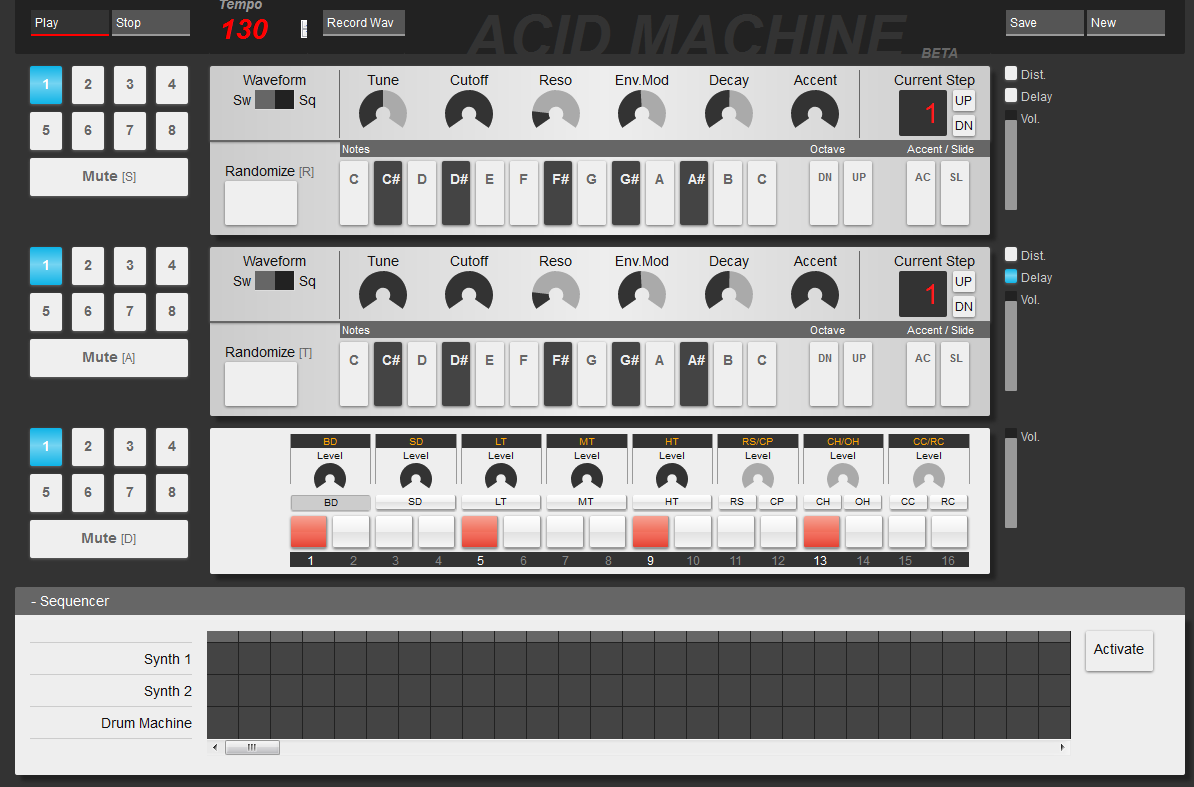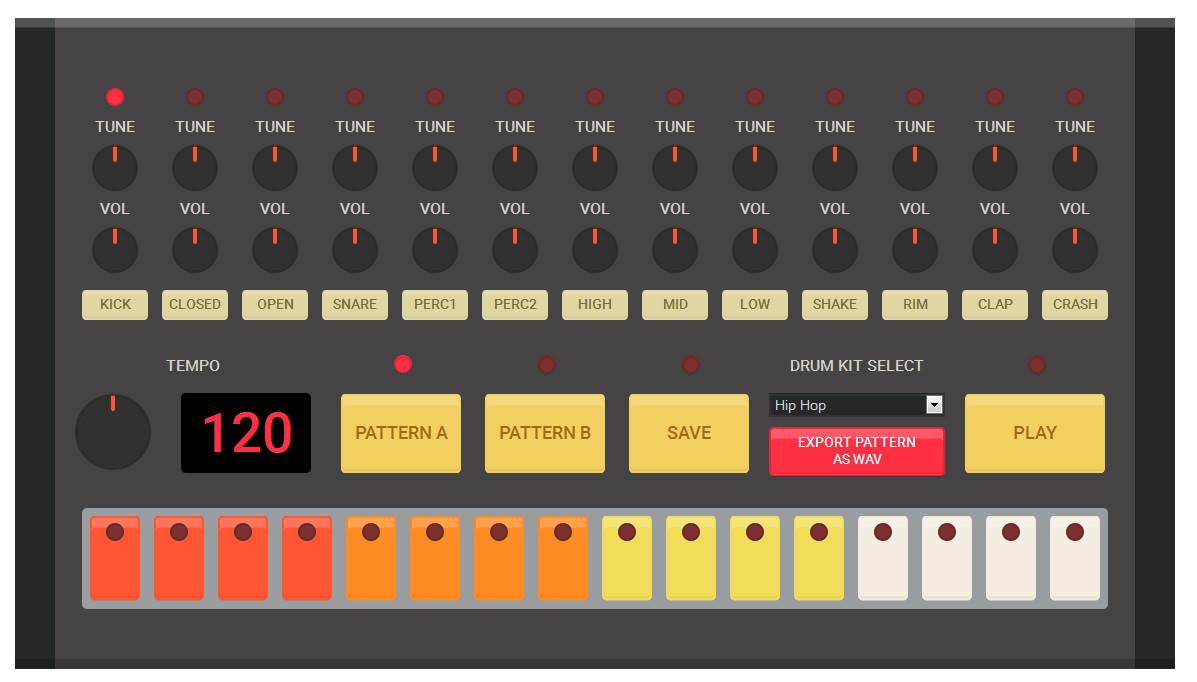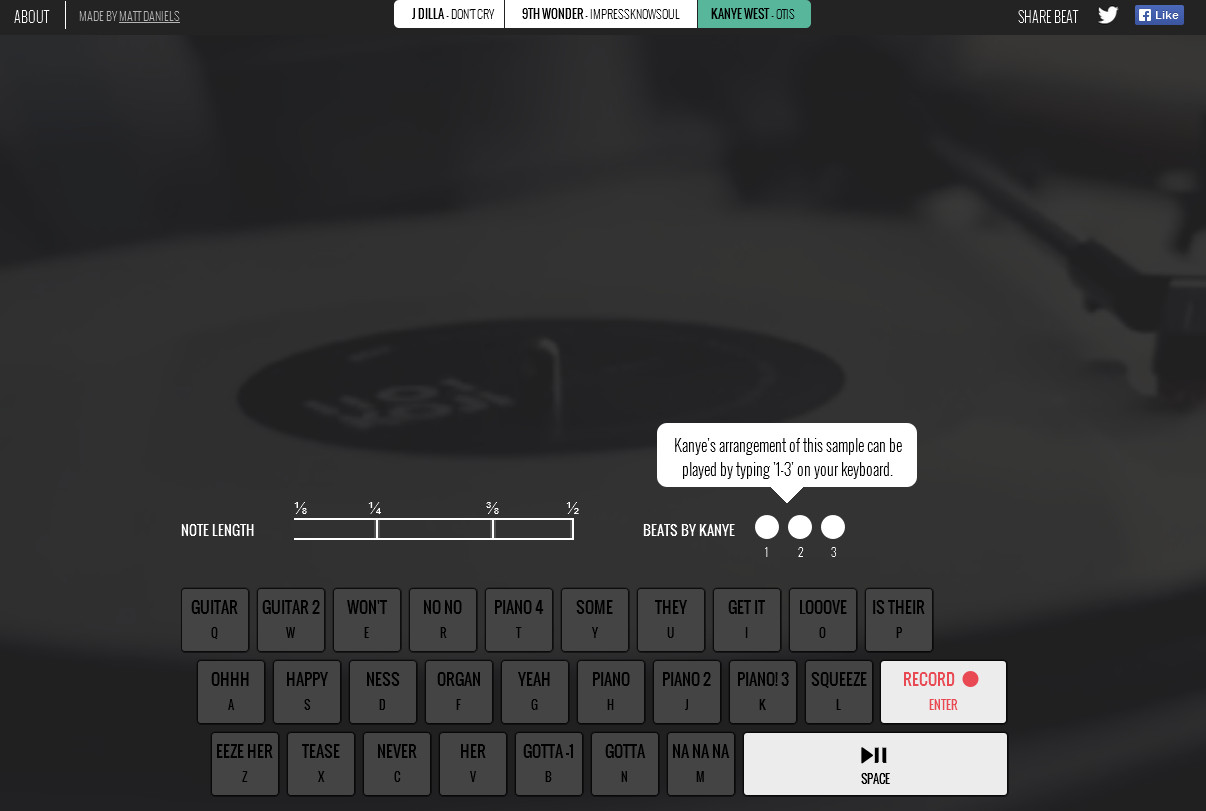Nowadays you can make music on on your browser – even if you can’t really play real instruments. I have earlier written about Patatap, and here are some new finding on this field:
ACID MACHINE BETA is a in-browser tool (uses HTML5 “magic”) that emulates Roland’s TB-303 bass synthesizer with built-in sequencer. It brings the essence of building a bass, lead and drum sequence to you without the need to install any additional software! (works well on Firefox and Chrome) It allows you to easily make your own ACID house music as the well-known “acid” sound is typically produced by playing a repeating note pattern on the TB-303 (like in this classic track).
According to Make acid house in your browser with Acid Machine article Acid Machine is described by developers Errozero as a “work in progress”, but it’s already working better than a faulty TB-303 found on eBay. As well as featuring two of the famous bass synthesisers, Acid Machine also features a drum machine. Acid Machine is making the dream of writing acid house tracks in the office a reality. Play with it for few minutes and you have some interesting sounding results!
Want some more drum machines? Emulate four classic drum machines in your browser article tells about HTML 5 Drum Machine Emulator that that can emulate five different kits: Roland’s iconic TR-808 and TR-909, the Linndrum, Elektron’s Machinedrum and an acoustic drum kit. You can create multiple 16-step patterns, manipulate the pitch and volume of each individual drum sample and even save patterns for the next time you visit the page. Once you’ve laid down your beat, you can even export the whole thing as a WAV file.
Or do you want to try to play with hip hop samples? Turn your computer keyboard into an MPC and recreate hip hop beats from Dilla, Kanye and 9th Wonder with interactive hip hop sampler Sample Stitch. Sample Stitch lets you reinterpret, record and even share your creations to Facebook and Twitter.



524 Comments
Tomi Engdahl says:
The first computerzed sampler CMI Fairlight
https://youtu.be/jkiYy0i8FtA
Tomi Engdahl says:
THERE’S NOW A PLAYABLE ONLINE DRUM MACHINE BASED ON THE ROLAND TR-909
The emulated instrument is free to use
https://mixmag.net/read/online-drum-machine-roland-tr-909-er-99-virtual-instrument-tech
Electronics and software engineer Matthew Cieplak has created a fully working browser-based drum machine based on the original Roland TR-909.
The virtual instrument, named ER-99, is now ready to be used online for free courtesy of Cieplak’s Extralife Instruments webpage – and it boasts a big selection of features.
Built to celebrate international 909 day, the emulator pays tribute to the world favourite TR-909, or in Cieplak’s words, “a famous Japanese drum machine from the 1980s”.
https://extralifeinstruments.com/er-99/
Tomi Engdahl says:
Rammstein sounds
https://youtu.be/BuMsrNi3Ikc
Tomi Engdahl says:
80′s drum
https://youtu.be/Wd1uGQIqg9w
Tomi Engdahl says:
15 Mistakes Every Music Producer Makes
https://www.youtube.com/watch?v=T473o9HWJ7c
Save Hundreds of Hours By Avoiding these Beginner, Intermediate and Professional Mistakes!
In this video I’m going to show you the biggest 15 mistakes every beginner intermediate and professional music producers make.
Some of the mistakes we will be looking at will include printing out DAW shortcuts to have in front of you, find other musicians to work with or shadow, learn some basic music theory both in rhythm and melody, learn how to write song structure including a verse and chorus, learn how to use automation, learn how to use buses in your DAW, follow your ears and not your eyes, don’t overmix, record some real sounds, chop up samples, be careful with your external storage and doubling up project locations, learn how to promote your music production business, document your music creation, practice getting onto spotify playlists and local radio, and make sure that you are looking out for mistakes that you make.
Timestamps
00:00 Save Time & Stress
00:30 Mistake No. 1
01:09 Mistake No. 2
02:04 Mistake No. 3
02:47 Mistake No. 4
03:10 Mistake No. 5
03:37 Mistake No. 6
04:16 Mistake No. 7
04:27 Mistake No. 8
04:54 Mistake No. 9
05:38 Mistake No. 10
06:06 Mistake No. 11
06:56 Mistake No. 12
07:25 Mistake No. 13
0:55 Mistake No. 14
08:08 Mistake No. 15
Tomi Engdahl says:
https://shop.playtronica.com/
Tomi Engdahl says:
Fatboy Slim says modern gear has too many options: “That is one of the reasons I don’t make so much music anymore”
The DJ-producer also explains why he thinks “everyone should have a 303” as part of their setup.
https://musictech.com/news/music/fatboy-slim-modern-gear-options-is-reason-behind-lack-of-music/
Tomi Engdahl says:
5 Chord Patterns for 5 Different Emotions
https://www.youtube.com/watch?v=ntWAukhk9gk
0:56 Happy Chords
4:40 Sad chords
8:12 Uplifting Chords
11:10 Powerful/Aggressive Chords
17:00 Dark Chords
Tomi Engdahl says:
Insanely Simple Method For Amazing Melodies
https://www.youtube.com/watch?v=5E4S7MBxJDA
4 Melody Patterns Every Producer Should Know
https://www.youtube.com/watch?v=-6pSn_S8huA
Tomi Engdahl says:
Turning YOUR Melodies into BANGERS!
https://www.youtube.com/watch?v=bz7hC24UklU
CHAPTERS
0:00 – Melody #1: Future Bass
01:25 – Melody #2: Polyphia
03:27 – Melody #3: RnB (-ish)
05:15 – Melody #4: Jersey Club
Tomi Engdahl says:
You’re Using Your Limiter WRONG
https://www.youtube.com/watch?v=GrtEbZcfaxo
In this video, I tell you about a super awesome way to use your limiter to maximize “pocket” and get that coveted major label sound and major label polish.
In order to understand why this works, we need to look the history of the mastering signal chain, its developments, and how its placements and techniques have characterized the songs we all grew up with.
Tomi Engdahl says:
Mixing Masterclass with Ronald Prent [Rammstein, Depeche Mode, Celine Dion, Def Leppard, Manowar]
https://www.youtube.com/watch?v=DSPw44C_0iA
Ronald Prent is an accomplished and innovative mixer with over 40 years of experience. He has worked in rock, pop, metal and classical, and has been a pioneer of multi-channel formats.
His long list of clients includes Celine Dion, Simple Minds, Freddie Mercury, Dire Straits, The Police, Rammstein, The Scorpions, Elton John, Tina Turner, Queensryche, Def Leppard, David Garret, Manowar, Depeche Mode and many more.
In this masterclass he shares his approach to mixing live instruments, taking us through the beginning stages of a mix in real time.
Tomi Engdahl says:
Ed Sheeran’s ‘Shape of You’: Making 2017’s Biggest Track | Diary of a Song
https://www.youtube.com/watch?v=ZpMNJbt3QDE
How Ed Sheeran, Johnny McDaid and Steve Mac made the most-streamed track of 2017.
Tomi Engdahl says:
ISLANDER Reaction Nightwish Guitar Tutor Reacts & Analyses Live At Tampere
https://www.youtube.com/watch?v=S9Kr3WvVCSo
Professional musician reacts to Nightwish Islander live Live At Tampere, first time hearing this song reacting to Maroc’s stellar vocals and analysing the performance, coming at it form the point of view of a guitar player. What do you do when you’ve got 2 lead vocalists in the band??? Let them both sing! Seems to work out aright for these guys!
Tomi Engdahl says:
4 Levels To Being An Audio Clown
https://m.youtube.com/watch?v=mvtbomwBuZQ&feature=youtu.be
Want to start being taken more seriously as an audio mixer? Miami shows you four ways to improve your mixing and lose the clown mentality.
Tomi Engdahl says:
Aphex Twin releases unique granular sample mashing app Samplebrain for free
https://musictech.com/news/gear/sample-brain-aphex-twin/
The app works by chopping up audio into a ‘brain’ of interconnected little sections, networked by similarity.
Electronic music icon Aphex Twin has launched a free and open source sample mashing app called Samplebrain.
While the design of the instrument came from Aphex Twin, it was engineered by Dave Griffiths of Then Try This. According to a post from the Aphex Twin blog, the idea behind Samplebrain came in the early 2000s, apparently inspired by the emergence of music discovery app Shazam.
https://youtu.be/YgldyiWQ5u0
Tomi Engdahl says:
The Best Synths of 2022? | Polyend, Behringer, Teenage Engineering, Roland, Elektron | Thomann
https://m.youtube.com/watch?v=3UrUYsym1FE&utm_source=facebook.com&utm_medium=cpc&utm_campaign=feed&utm_content=Top_5_Synth&fbclid=IwAR2MxMIjcQ3Phn_0hkgfDgAGJ-kU8wZIsuDudAuEQpL7gPsna_s7N-cCT8w
Tomi Engdahl says:
https://musictech.com/news/gear/sample-brain-aphex-twin/
Tomi Engdahl says:
https://www.ethanhein.com/wp/2022/the-whole-tone-scale/
Tomi Engdahl says:
https://en.wikipedia.org/wiki/List_of_pieces_that_use_the_whole-tone_scale
Tomi Engdahl says:
https://www.reddit.com/r/musictheory/comments/hzft0e/does_anyone_have_examples_of_uses_of_whole_tone/
https://www.reddit.com/r/musictheory/comments/ydjzlj/are_there_any_cool_songs_with_whole_tone_scales/
Tomi Engdahl says:
Hardcore techno’s alternative history – Case: Dance of the Anthropoids – Electric Byway
https://www.youtube.com/watch?v=Qfk7OY8eiBE
Was the first released prototype of hardcore techno actually released in 1968 in Finland? In this video, we take a look at the history of hardcore techno and speedcore, and a particular 1960′s experiment of high tempo rhythmic electronic music and its creator.
Tomi Engdahl says:
“Thousand” was listed in Guinness World Records for having the fastest tempo in beats-per-minute (BPM) of any released single, peaking at approximately 1,015 BPM.
https://en.m.wikipedia.org/wiki/Thousand_(song)
Tomi Engdahl says:
Tulevaisuus, jota ei tullutkaan: itäsaksalainen syntetisaattori Subharchord oli aikaansa edellä, mutta historia unohti sen – nyt ihmesoitin tekee paluuta
https://yle.fi/aihe/a/20-10003713
Tomi Engdahl says:
Taylor Swift has used one particular chord progression 21 times, says this pianist
By Ben Rogerson published 2 days ago
David Bennett has gone back through Swift’s discography and come up with her top 5
https://www.musicradar.com/news/taylor-swift-top-5-chord-progressions?utm_content=musicradar&utm_medium=social&utm_campaign=socialflow&utm_source=facebook.com
Tomi Engdahl says:
Amiga ja ProTracker mainittu!
”Kyllä siinä addiktiosta oli kyse” – Tekno vei Proteuksen sydämen, ja nyt hän lopettaa keikkailun
https://voima.fi/artikkeli/2022/kylla-siina-addiktiosta-oli-kyse-tekno-vei-proteuksen-sydamen-ja-nyt-han-lopettaa-keikkailun/
Rankan elektronisen musiikin legenda Harri “Proteus” Andersson lopettaa 27-vuotisen artistiuransa joulukuussa. Keho ei enää kestä kiertue-elämää.
Tomi Engdahl says:
OBSOLETE SOUNDS
Obsolete Sounds is the world’s biggest collection of disappearing sounds and sounds that have become extinct – remixed and reimagined to create a brand new form of listening.
http://citiesandmemory.com/obsolete-sounds/
Tomi Engdahl says:
Final word on debunking this evil urban myth
The Great Myth of the Medieval Tritone Ban
https://m.youtube.com/watch?v=3MhwGnq4N9o
Tomi Engdahl says:
I don’t suck; I’m avant-garde!
When someone criticizes your work, don’t actually listen to them. Tell them to back off because it’s Experimental [Genre] and it’s suppose to sound that way! #billablehours
Tomi Engdahl says:
MEME
Paul McCartney & Rick Rubin Listen To CANNIBAL CORPSE
https://www.youtube.com/watch?v=I3M9iYfdDzo
A super funny meme edit of Paul and Rick ‘listening’ to “All Star” by Smash Mouth’s been going around recently, and I felt inspired to do my own version! I managed to find the stems to Cannibal Corpse’s “Hammer Smashed Face” online so went with that. Needless to say it turned out incredibly silly!
Tomi Engdahl says:
We discovered a 10GB goldmine of free electronic music samples
https://www.musicradar.com/news/glitchdotcool-free-samples
By Matt Mullen( Future Music ) published 8 days ago
Audiovisual arts collective glitch[dot]cool’s Glitch With Friends packs contain some of the best free sounds we’ve found this year
Tomi Engdahl says:
Benn Jordan (The Flashbulb) has a few videos on the subject. Worth a watch
https://m.youtube.com/watch?v=XnjzWMu9soY&t=491s
Tomi Engdahl says:
Yli 40 vuotta sitten julkaistiin kone, joka muutti täysin musiikin tekemisen – Tuotanto loppui yllättäen 3 vuotta myöhemmin: Syynä hämmentävä tekninen salaisuus
https://www.tekniikkatalous.fi/uutiset/yli-40-vuotta-sitten-julkaistiin-kone-joka-muutti-taysin-musiikin-tekemisen-tuotanto-loppui-yllattaen-3-vuotta-myohemmin-syyna-hammentava-tekninen-salaisuus/b2c5d432-d459-4701-baa8-63d1758e2be2
Rolandin rumpukone TR-808 soi lukemattomissa hittibiiseissä edelleen. Erikoisia ääniä tuottanutta laitetta valmistettiin vain 12 000 kappaletta ja tuotanto pysähtyi juuri kun laitteen suosio alkoi nousta.
Jokainen on kuullut sen äänen, mutta harva on nähnyt itse soitinta. Vuonna 1980 markkinoille tuotu japanilainen rumpukone Roland TR-808 on ollut hip hopissa ja elektronisessa musiikissa yhtä merkittävä soitin kuin Fender Stratocaster -kitara rockissa.
Tunnusomainen 808-soundi kuuluu muun muassa soul- ja funk-legenda Marvin Gayen vuoden 1982 jättihitin ”Sexual Healing” rytmissä. Vaihtaminen koneelliseen soundiin siivitti Gayen lopulta Grammy-voittajaksi. Muita klassisia esimerkkejä rumpukoneen käytöstä ovat Whitney Houstonin ”I Wanna Dance with Somebody” (1987) ja Phil Collinsin ”Another Day in Paradise” (1989).
Legendaariseen asemaan nousseita rumpukoneita valmistettiin vuosina 1980–1983 yhteensä vain 12 000 kappaletta. Toimivia laitteita on nykyään jäljellä arviolta 2 000 ja niistä maksetaan nettihuutokaupoissa tuhansia dollareita, mikäli niitä tulee myyntiin.
Se oli yksi ensimmäisistä ohjelmoitavista rumpukoneista eli sen käyttäjä saattoi itse ohjelmoida haluamansa rytmin valmiista vaihtoehdoista valitsemisen sijaan.
Mullistava ominaisuus oli myös mahdollisuus säätää yksittäisten äänien äänenvoimakkuutta ja sointiväriä. Laitteen takapaneelissa oli tuon ajan mittapuulla erittäin monipuoliset audioulostulot.
TR-808 ei kuitenkaan kuulostanut lainkaan oikeilta rummuilta. Bassorummun ääni oli tavallista huomattavasti matalataajuisempi ja kummallisesti kumiseva, symbaalit sihisivät luonnottomasti ja lehmänkellokin kuulosti lähinnä tietokoneen virheääneltä. Tästä syystä laite sai muusikkopiireissä valjun vastaanoton, kunnes elektronisista äänistä innostuneet hip hop -tuottajat innostuivat outolintuna pidetyn laitteen äänistä muutamaa vuotta myöhemmin. Hip hop ja elektroninen musiikki kasvattivat vuosien mittaan suosiotaan ja 808:n ääntä onkin sittemmin kuultu lähes kaikissa musiikin tyylilajeissa.
Omituiset äänet johtuivat siitä, että ne oli luotu täysin synteettisesti rumpukoneen elektronisissa piireissä. Tuon ajan studioissa käytetyt huomattavasti kalliimmat rumpukoneet hyödynsivät oikeista rummuista äänitettyjä ääninäytteitä, mutta 808 oli suunniteltu edulliseksi laitteeksi. Tietokonemuisti oli 1980-luvun alussa hyvin kallista
Elektronisissa instrumenteissa, kuten syntetisaattoreissa ja rumpukoneissa äänen tuottamiseen käytetään erityistä kohinapiiriä.
Kohina tuotetaan tyypillisesti joko diodilla tai transistorilla. Eri komponentit tuottavat erilaista kohinaa
TR-808:ssa kohina tuotettiin transistorin avulla. Roland osti rumpukoneitaan varten suurten elektroniikkavalmistajien Toshiban ja Panasonicin hylkäämiä transistoreja, jotka eivät läpäisseet valmistajien laaduntarkastusta. Vaikka nämä vialliset komponentit eivät täyttäneet tehtaan laatuvaatimuksia, ne tuottivat juuri rumpukoneisiin sopivaa kohinaa.
Elektronisiin instrumentteihin erikoistuneen Secret Life of Synthesizers -sivuston mukaan 808-rumpukoneissa käytetyt komponentit olivat hylättyjä yksilöitä 2SC828-R-transistoreista, joka oli melko tavanomainen npn-transistori. Rolandilla näiden hylättyjen transistorien tuottamaa kohinaspektriä tutkittiin tarkemmin ja laitteisiin valittiin ne yksilöt, jotka saivat aikaan erityisesti rumpukoneen virvelirumpu- ja taputusäänissä tarvittavaa sihinää.
Alkuperäisistä 808-rumpukoneista jokainen on hieman erilainen, sillä kaikki niissä käytetyt transistorit olivat hieman eri tavalla viallisia. Perusääniltään ne ovat kuitenkin kaikki yhtä perhettä.
808:n perintö jäi kuitenkin elämään, sillä sen ääniä on tallennettu lukuisille äänitteille. Rumpukoneen transistorien kohinaspektriäkin on analysoitu ja mallinnettu digitaalisesti, joten jäljitteleviä laitteita on pystytty tuomaan markkinoille
https://io808.com/
Tomi Engdahl says:
While many have attempted over the years to recreate Jean-Michel Jarre‘s classic Oxygène 4 using vintage and modern gear, this is the first version made with mind-bullets:
Jean-Michel Jarre’s Classic ‘Oxygene 4’ Recreated With 19KB Of Javascript
https://www.synthtopia.com/content/2022/12/27/jean-michel-jarres-classic-oxygene-4-recreated-with-19kb-of-javascript/
https://dittytoy.net/ditty/24373308b4#echo=0.26622
Tomi Engdahl says:
https://hackaday.com/2023/01/02/generative-music-created-in-minimalistic-javascript-code/
Tomi Engdahl says:
https://www.synthtopia.com/content/2022/12/29/new-software-synth-picosynth-lets-you-get-your-retro-on-in-8-bit-style/
Tomi Engdahl says:
https://www.gearnews.com/great-songs-made-with-bad-gear-featuring-audio-pilz/
Tomi Engdahl says:
https://www.soundi.fi/levyarviot/arvio-jean-michel-jarre-kokonaisvaltaisen-aaniseikkailun-aarella-oxymore-on-pellepelottoman-tribuutti-oppi-isilleen/#Echobox=1672399421
https://www.rumba.fi/uutiset/maailman-parhaaksi-soittajaksi-arvostettu-16-vuotias-suomalainen-julkaisi-epn-kuuntele-sinkku-taalta/
Tomi Engdahl says:
https://www.soundi.fi/uutiset/metal-hammerin-lukijat-ovat-puhuneet-tassa-ovat-vuoden-kovimmat-metallibiisit-suomi-mainittu-kahteenkin-kertaan/
Tomi Engdahl says:
I found the 15 BEST FREE PLUGINS on the internet (and they are soooo good)
https://www.youtube.com/watch?v=0BTcW2PNrnA
Tomi Engdahl says:
How Auto-Tune DESTROYED Popular Music
https://www.youtube.com/watch?v=6IV29YNTH3M
Tomi Engdahl says:
Legendary Instruments – Jean Michel Jarre
https://www.youtube.com/watch?v=ctOhwRGdVvo
Tomi Engdahl says:
Chord Tricks Avicii Used To Hook You
https://www.youtube.com/watch?v=wnuakp_sNJs
Tomi Engdahl says:
The Bass Line Of “I Feel Love” On A TB-303
https://www.youtube.com/watch?v=sIBSN1_9Geo
Today we show you how to reproduce the bass line of ‘I Feel Love’ by Donna Summers with Roland Bass Line TB-303.
Tomi Engdahl says:
https://theproaudiofiles.com/11-free-soft-synth-plugins-for-your-collection/
Tomi Engdahl says:
https://filmora.wondershare.com/audio-editing/best-audio-mixer-software.html
Tomi Engdahl says:
https://www.synthanatomy.com/2023/01/apricot-a-free-subtractive-synthesizer-plugin-for-mac-win-and-linux.html
Tomi Engdahl says:
Secret techno chords
https://youtube.com/shorts/yVMr3YwDEfk?feature=share
Tomi Engdahl says:
The Klone Is A FREE Overdrive Pedal Plugin By Fazertone
https://bedroomproducersblog.com/2021/11/29/the-klone-fazertone/
Fazertone offers The Klone, a FREE overdrive guitar pedal plugin for macOS and Windows.
I’m sure the name gave it away, but The Klone is based on the legendary Klon Centaur overdrive pedal.
Although it’s easier to find a Klon Centaur than a half-man/half-horse creature, the two share a similar mythical status. Finding one of Bill Finnegan’s iconic pedals in close to perfect condition is no easy task, and if you do, you better have deep pockets.
Tomi Engdahl says:
https://steinbergmedia.github.io/vst3_doc/vstsdk/index.html